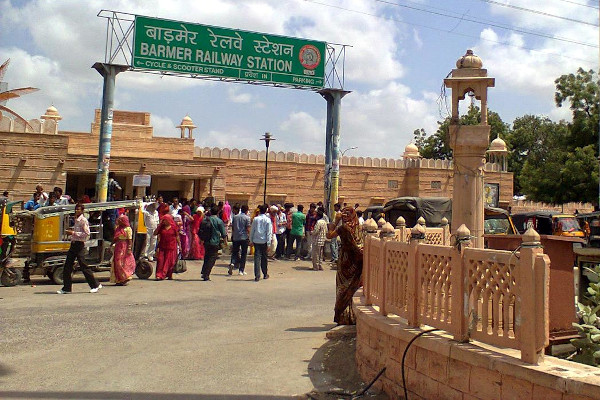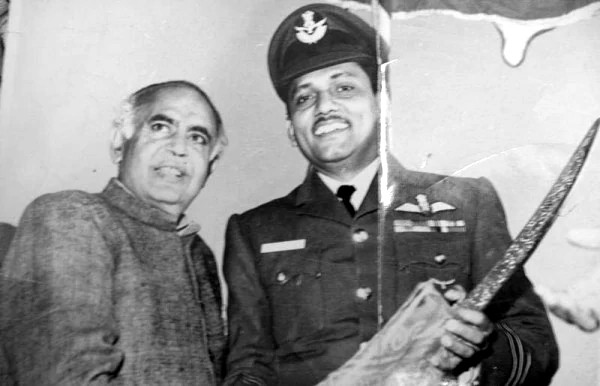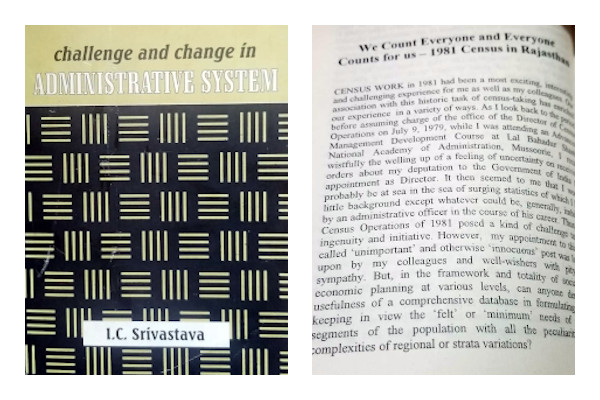Interface with political leaders: Shri Barkatullah Khan and Shri C.M. Baid

I. C. Srivastava was born in 1943. A student of English Literature, he joined the Indian Administrative Service in 1966. During his 37 year tenure, he served as Collector/ District Magistrate of three districts, rising to the position of Chairman, Board of Revenue, Rajasthan.
Shri Srivastava worked as Secretary/Principal Secretary of as many as 17 Rajasthan State Departments, including Revenue, Irrigation, Education, Culture, Tourism, Sports, and Women & Child Development Department. He retired as Chairman, Rajasthan State Mines and Minerals Corporation.
Shri Srivastava has authored several books on Administration & Current affairs in Hindi and English. Nowadays, he is associated with various social and cultural voluntary organisations in Jaipur.
Editor's Note: This is the third part of a series on life as an IAS officer by Shri I. C. Srivastava. The first part is Memorable and Useful Experiences as an IAS officer while the second part is Interface with and Interference by Political Masters.
Two other Congress leaders with whom I came in contact stand out as great political stalwarts. If one goes by the adage, some are born great, some achieve greatness and some others have greatness thrust upon them, while Shri Sukhadia was a great achiever Shri Barkatullah Khan had the greatness thrust upon him.
Shri Khan was called upon by the then Prime Minister Indira Gandhi to assume the mantle of Chief Minister ship immediately on his return from a visit to Middle East when Shri Sukhadia was asked to step down ostensibly for his supporting Congress (O) leaders Morarji Desai and others as the Congress party split into two.
Shri Barkatullah Khan with his buxom demeanor and heavy gait gave the impression of an easy going person but on close contact he revealed the essential human and humane side of his personality. The imminent war with Pakistan arising from India's intervention in the ongoing war between Mukti Bahini of the erstwhile East Pakistan and Pakistan army provided several opportunities to me as Collector, Barmer to come in contact directly with Shri Khan.

Barmer railway station
His bear-hug on alighting from the plane at Uttarlai or the car besides generating warmth also kindled the right mood and spirit for interaction with him individually or during meeting with officers. An occasional pat on the shoulder was also in order to serve the same purpose.
This warmth in relationship was clearly reflected in the following two episodes. In the last week of October 1971, an officers’ meeting was convened in the Dak Bungalow chaired by the Chief Minister to review and gear up the preparatory measures for the war which was considered a certainty in view of the assistance provided by Indian forces to Mukti Bahini of the then East Pakistan.
Just before the start of the meeting, sitting beside the Chief Minister, at the head of the table, hesitatingly I opened the ordinary non-official envelope containing the letter from my wife who had delivered a son on 15th September 1971. Before I could glance through the contents, the CM happened to notice the letter and asked me in whispers “Is it from your wife? Go ahead and read it”.
Probably, my facial expressions revealed all my inner feelings. In sheer excitement, I told him in low tone “My wife wants to join me here urgently but I wish to tell her not to come over here due to war being imminent as the child is barely a month and half.”
God only knows what inner voice prompted Shri Khan to exclaim, “You know, Gentlemen, Collector Sahib’s wife wants to join him in his war effort along with a small child and Srivastavaji is going to tell her not to come to Barmer. I think Collector’s wife is more brave. I am asking him here and now not to prevent her from coming here as it will give a good boost to the morale of the officers’ their families and to others as well.”
I was flabbergasted and speechless for a while and then everyone had a hearty laugh as I nodded in agreement with CM’s suggestion which left no scope for any further thinking. I telephoned Archana to come over to Barmer post-haste as the clouds of war were gathering and threatening to burst before long. Needless to add, her arrival not only set the house in order but raised the spirits of the members of the families of other fellow officers living in the Government Colony located behind the Collector’s bungalow.
The other episode relates to the aftermath of the bombing of Railway Station of Barmer on the night of 8th-9th December 1971 by Pakistani fighter planes. CM Khan was visiting Jaisalmer on the 9th December and was scheduled to visit Barmer on the 10th December. Shri Bhim Singh, the then Border Commissioner, discussed the situation in the wake of bombing as aforesaid.
I explained to him, at some length, the situation especially the departure of some traders’ families in panic. I also briefed him about the efforts we were making to keep up the morale of the people high by addressing them on the microphone network address system and by convening Citizens’ Council meeting. Shri Bhim Singh, a highly experienced but a flamboyant officer initially did not agree with my advice to CM (to be conveyed through him) to postpone his visit to Barmer on the 10th December 1971 as scheduled, by a few days so that we could bring the situation under control especially by making urgent and earnest request to Air Commodore at Jodhpur to provide night cover over Barmer town by deploying MIGs at Uttarlai.
When the arrival of MIGs was announced by a loud bang of their crossing the sound barrier, people sighed with great relief. Shri Bhim Singh telephoned again to say that CM had expressed a desire to come despite my advice. With complete composure and in a clear tone I insisted that my advice, given on grounds of security should be accepted. The Chief Minister Khan graciously relented and decided not to come for a few more days. When CM Khan did come later, after his usual affectionate bear hug, he gave me a pat on the back for handling the situation well.

Chief Minister Barkatulluah Khan with Uttarlai Base Commander, Wing Commander V. K. Murty.
Shri Chandan Mal Baid who served as a Minister in Sukhadiaji’s ministry was another remarkable political personality who inspired confidence and respect amongst the officers of the State. In a way he was one of the longest surviving senior ministers in various Congress ministries.
I had met him on a few occasions during my short tenure as Deputy Secretary, Education in 1973 when he held the education portfolio besides being Finance Minister. But, during my eventful tenure in 1976-77 as Collector, Sri Ganaganagar, Shri Baid visited the district as minister-in-charge for review of implementation of PM’s Twenty-Point Programme.
During these meetings and otherwise as well, his frank, forthright advice and directions helped me in gearing and toning up the administrative machinery for a variety of tasks especially the Family Welfare Camps and the National Savings Campaign. Our work was recognized by the Government resulting in the declaration of Ganaganagar District as the number one in the state. The efficient management of the the Family Welfare camps symptomatic of the emergency measures, however, saved the district from going the ‘excesses’ way leading to Shah Commission Enquiry.
Shri Baid had strong views on Twenty-Point Programme and had the courage of conviction not to mince words when it came to pointing out the weaknesses in the implementation. His loud and clear voice and appreciation of problems faced by field officers set the tone and the pace of implementation of the programme. It enthused the officers across all the departments which enabled them to achieve the tasks assigned to them.
With the change of government in 1977, I was again posted out of Jaipur, after a short stint as Director, National Savings, as Collector Bharatpur. However, within one year, I received two posting orders, viz., Excise Commissioner (lasting 4-5 months) and Secretary to Governor (lasting eight months).
Finally, I went on deputation to Government of India and was posted as Director, Census Operations for Rajasthan with headquarters at Jaipur. In this capacity, I got a chance of meeting Shri C.M. Baid at Raj Bhawan ‘at home’ hosted by the then H.E. the Governor on 15th August 1979.
Of course, Shri Baid was still an MLA and one of the few erstwhile ministers to retain their seats in post-emergency scenario. He hugged me warmly, and spoke highly of my work done as Collector, Sri Ganaganagar adding a remark: “Jaise kisi bahut achhi cheej ko kahin rakhkar bhool jaate hain, sarkar ‘aapko jan ganana’ mein bhej kar bhool gayee hai”. What could I say?
Tables were turned against Congress.
In real terms I was enjoying my assignment with Census dept, free from the fever and fret of state administration. My stint with Census for four years turned out to be one of the best and most satisfying one. As Director Census I also got an opportunity of spending nine months on training in Development Administration at the University of Manchester, UK.
An account of my experience of work done in the Census dept is covered fully covered in the chapter “We count every one and every one counts for us” in the book Challenge and Change in Administrative System.

The chapter on the census department in the book Challenge and Change in Administrative System.
Comments
Interface with political leaders
Went through this article , it revives my memories of war time when I was in school. Very nice to share these memories of person life of him with political leaders, my congratulations for his great achievements and good wishes for his health. Regards
Interface with political leaders
Editor of the website www.inourdays.org has done a great job in locating and uploading the picture of the then C.M. Shri B Khan with Wing Commnader VK Murty who was the Base Commander Uttarlai Air Base . Murty has become a friend before and during Indo Pak War 1971 but I lost touch later on . So happy to see his photo on my story
Add new comment